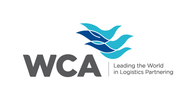

T3u—Introduction to Cargo Transportation for Shippers, Importers, Exporters (U.S.)
Subscriber price: $215.00, Non-subscriber price: $279.00
Estimated total study time: 15 hours 0 minutes
![]()
This course is designed as a primer for entry-level exporter/importer personnel who are or will be involved in selecting and working with any mode of commercial cargo transportation. This course includes U.S. regulatory information. It should also be taken as a foundation by anyone planning to take more advanced cargo-related courses.
Individuals wishing to learn more basics about U.S. Export and Import processes should also consider completing the following GISTnet courses:
- C20u—Intro to U.S. Export-Import Basics: Transaction Negotiation, Incoterms, Payment Terms
- E1u—Introduction to U.S. Export Regulation
- E2u—U.S. Exports Subject to Controls; Export Licensing Procedures for Exporters
- C21u—Introduction to U.S. Importing: The Customs Release and Entry Process
- C22u—Customs Entry Procedures and Enforcement
Cargo Transportation—Basic Concepts and Issues (U.S.)
In this lesson we begin to take up the primary modes of cargo transportation and examine their respective characteristics, advantages and limitations.
Regardless of which transportation modes we may have a particular interest in based on our current work or job assignment, everyone involved in cargo routing, carrier selection or cargo documentation should have at least a basic understanding of the comparative characteristics of all commercial modes of transportation. This is especially true of anyone involved in routing intermodal movements and/or determining which combination of transport modes should be used in meeting specific shipment needs.
(Estimated study time: 46 minutes)
Cargo Transportation Modes, Beginning with Inland and Intra-Coastal Waterways
In this lesson we begin an overview of the primary modes of cargo transportation, beginning with inland waterway.
Regardless of which transportation modes we may have a particular interest in based on our current work or job assignment, everyone involved in cargo routing, carrier selection or cargo documentation should have at least a basic understanding of the comparative characteristics, advantages and limitations of all commercial modes. This is especially true of anyone involved in routing intermodal movements and/or determining which combination of transport modes should be used in meeting specific shipment needs.
(Estimated study time: 20 minutes)
- Introduction
- Inland Waterway and Intra-Coastal (Short-Sea) Transportation
- History
- Advantages of Inland Waterway and Inter-Coastal (Short Sea) Transportation
- Disadvantages/Limitations of Inland Waterway Transportation
Cargo Transportation Modes: Deep Sea Shipping
This lesson addresses the history pf deep sea (ocean) cargo transportation, and compares the advantages and limitations of this mode vs. other modes.
(Estimated study time: 45 minutes)
Cargo Transportation Modes: Rail Transportation
This lesson addresses the history of rail transportation, and compares the advantages and limitations of this mode vs. other modes.
(Estimated study time: 20 minutes)
- Introduction
- Rail Transportation
- History
- Advantages of Rail Transportation
- Disadvantages/Limitations of Rail Transportation
Cargo Transportation Modes: Air Cargo Transportation
This lesson addresses the history of air cargo transportation, and compares the advantages and limitations of this mode vs. other modes.
(Estimated study time: 17 minutes)
- Introduction
- Air Cargo Transportation
- History
- Advantages of Airfreight
- Disadvantages/Limitations of Airfreight
Transportation Modes: Truck Transportation; Cost Comparisons Among Modes
(Estimated study time: 40 minutes)
- Introduction
- Truck Transportation (Motor Carriers)
- History
- Advantages of Truck Transportation
- Disadvantages/Limitations of Truck Transportation
- Other Mode Carriers
- Cost Comparison of Cargo Transportation Modes
Cargo Transportation Trends as Part of Broader Logistics Services
This lesson addresses long-term and recent trends in cargo transportation as it relates to the services of cargo consolidators, integrated carriers, and 3PLs (door-to-door logistics).
(Estimated study time: 47 minutes)
- Introduction
- Cargo Transportation Trends as Part of Broader Logistics Services
- History of Multimodal Indirect Carriers (Consolidators & Door-to-Door)
- The Single Source "Door-to-Door" Logistics
- Recent Industry Trends—Forwarders Extending Scope of Services
- Current Logistics Services in Response to Shipper (Customer) Preferences
- Seamless Logistics and Information Systems
Shipper-to-Carrier Relationship
This lesson defines the three alternative types of relationship between cargo transportation carriers and shipper.
(Estimated study time: 1 hour 8 minutes)
- Introduction
- Shipper-to-Carrier Relationship
- Common Carriage
- General
- Tariffs and Common Carriage
- Carrier Liability Terms/Limits
- Contract Carriage
- General
- Common Carriage Masquerading as Contract Carriage
- Private Carriage
- Services In Addition to Carriage
- Common Carriage
Direct vs. Indirect Carriage; Carrier-to-Carrier Relationships; Freight Forwarders
In this lesson we explain and differentiate between direct carriage provided by asset-operating carriers (e.g., shipping lines operating vessels, airline, truck operators), and indirect carriage in which freight forwarders issue their own contracts of carriage to shippers. This enables forwarders to provide several value-added services that a shipper would not typically receive from a direct carrier, and particularly on small shipment. Indirect carriage plays a prominent role in ocean, air and through intermodal movement.
(Estimated study time: 1 hour 8 minutes)
- Introduction
- Direct vs. Indirect Carriage
- General
- Direct Carriage
- Indirect Carriage
- Indirect Carrier Terms and Conditions; Carrier Liability
- Direct and Indirect Carriage Combinations
- Carrier-to-Carrier Arrangements
- Co-Loading
- Substituted Service
- Cargo Pooling/Joint Services
- Sub-Contracting of Conveyances/Conveyance Operators
- Freight Forwarders, Indirect Carriers, Integrated Carriers, Substitute Services
Transportation Carrier Regulation; Tariffs
(Estimated study time: 30 minutes)
U.S. Transportation Carrier Regulation
This lesson addresses the various types of U.S. regulation of commercial cargo transportation, and the U.S. Agencies that perform such regulation.
(Estimated study time: 1 hour 1 minute)
- Introduction
- Cargo Transportation Carrier Regulation in the U.S.
- General
- Safety Regulation
- FMC Regulation of Ocean Common Carriage (U.S.)
- ICC Regulation (Historical Perspective)
- Surface Transportation Board
- U.S. Transportation Security Regulation
- State/Local Transportation Regulation
- U.S. Regulation of Cargo Carriers' Commercial Practices
- General
- U.S. Treaty Participations
Cargo Transportation Carrier Tariffs
This lesson covers the generic features, distinct sections and typical content of cargo transportation tariffs.
(Estimated study time: 49 minutes)
- Introduction
- Carrier Tariffs—General
- Tariffs & Common Carriage
- Tariff Format—General
- Table of Contents
- Rules Section
- Commodity/Class Index
- Rate Section(s)
- Shared Tariff Arrangements
- Joint Tariff Filing
- Participation in the Tariff of Another Carrier
- Adoption by Reference
- Limitations of Shared Tariff Arrangements
Cargo Freight Rate Structures/Charges
In this lesson we take up many factors which influence cargo transportation costs (for example, transportation mode, distances involved, cargo characteristics and shipper/carrier circumstances influence cost) and rate basis (that is, type of rate, and the unit of measure on which it is computed).
(Estimated study time: 43 minutes)
- Introduction
- Cargo Metrics and Conversion Factors
- General—Weight and Cube
- Measuring Cargo
- Conversion Factors between Metric and English
- Transportation Mode
- Water Mode
- Rail Mode
- Truck Mode
- Air Mode
Additional Factors Which Influence Freight Rates
This lesson continues the topic of how cargo transportation costs are affected by what is being shipped, distance, and special handling requirements and, of course, mode of transportation.
(Estimated study time: 51 minutes)
- Introduction
- Geographical Routes/Routing Options
- Commodity
- Total Shipment Size and/or Weight
- Cargo Density
- Cargo Packaging/Configuration
- Shipper Circumstances and Volume of Cargo Shipped
- Carrier and Carrier Combinations
Ocean and Intermodal Freight Rates & Charges
In this lesson we continue our coverage of transportation rates and accessorial charges. Cargo carriers of all modes tend to use the same basic types of rates: commodity rates, class rates, combination rates, and/or lump-sum full-vehicle rates (for example, container rates, FTL or carload/piggyback rates).
(Estimated study time: 50 minutes)
- Introduction
- Commodity Rates
- Class Rates
- Through Intermodal Rates
Ocean and Intermodal Freight Rates & Charges, cont.
This lesson focuses freight charges used in ocean and through intermodal transportation involving ocean mode.
(Estimated study time: 45 minutes)
- Add-on or Component Rates
- Other/Special Purpose Rates
- Accessorial Charges
- Conference Rates/Tariffs
- VOCC-Shipper Service Contracts
- Ocean Forwarder/NVO-Shipper Contracts
Types of Rates/Charges Used in Air Cargo Transportation
This lesson focuses freight charges used air cargo transportation.
(Estimated study time: 1 hour 23 minutes)
- Introduction
- Types of Rates/Charges used in Air Cargo Transportation
- History of Air Cargo Rate Structure
- Types of Air Cargo Rates & Precedence of Rates
- Air Cargo Chargeable Weight (International); Actual vs. Volume Weight
- Add-on or Component Rates
- Container Rates
- Other/Special Purpose Rates
- Surcharges
- Accessorial Charges
Types of Rates/Charges Used in Rail & Truck Transportation; Forwarder Rates
In this final lesson of our course we continue our coverage of transportation rates and accessorial charges by identifying and describing types of rates commonly used in truck and rail transportation.
(Estimated study time: 54 minutes)
- Introduction
- Type of Rates/Charges Used in Truck/Rail Cargo Transportation
- Class Rates
- Commodity Rates
- Rail Intermodal "Plan" Rates/Service Codes
- Other/Special Purpose Rates
- Through and Add-on or Component Rates
- Accessorial Charges
- Shippers' Agents, Domestic Indirect Carriers
- Freight Forwarders, Indirect Carriers, Integrated Carriers, Substitute Services
Transportation Carrier Liability for Cargo Loss or Damage; Overview of Cargo Insurance
(Estimated study time: 1 hour 4 minutes)